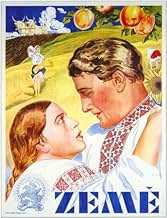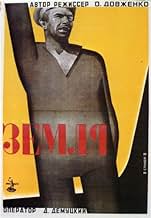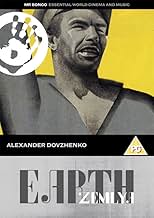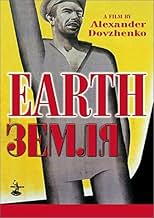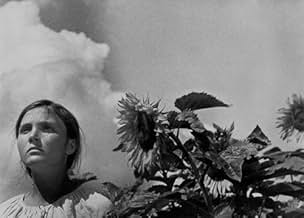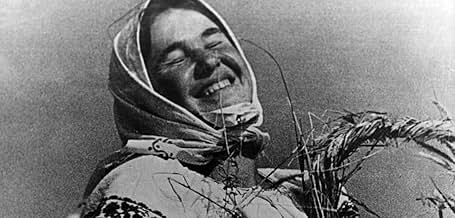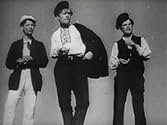CALIFICACIÓN DE IMDb
7.2/10
6.7 k
TU CALIFICACIÓN
Agrega una trama en tu idiomaIn the peaceful countryside, Vassily opposes the rich kulaks over the coming of collective farming.In the peaceful countryside, Vassily opposes the rich kulaks over the coming of collective farming.In the peaceful countryside, Vassily opposes the rich kulaks over the coming of collective farming.
- Dirección
- Guionista
- Elenco
- Premios
- 1 premio ganado y 1 nominación en total
Stepan Shkurat
- Opanas
- (as S. Shkurat)
Semyon Svashenko
- Vasyl - son of Opanas
- (as S. Svashenko)
Yuliya Solntseva
- Daughter of Opanas
- (as Yu. Solntseva)
Yelena Maksimova
- Natalya - Vasyl's fiancee
- (as Ye. Maksimova)
Nikolai Nademsky
- Ded Semyon
- (as N. Nademsky)
Ivan Franko
- Kulak Belokon
- (as I. Franko)
Pyotr Masokha
- Khoma - son of kulak Belokon
- (as P. Masokha)
Vladimir Mikhaylov
- Priest
- (as V. Mikhaylov)
Pavel Petrik
- Young Party-Cell Leader
- (as P. Petrik)
P. Umanets
- Chairman of the Village Soviet
- (as Umanets)
Luka Lyashenko
- Young Kulak
- (as L. Lyashenko)
Vasiliy Krasenko
- Old Peter
- (sin créditos)
M. Matsyutsia
- Farm Girl
- (sin créditos)
- Dirección
- Guionista
- Todo el elenco y el equipo
- Producción, taquilla y más en IMDbPro
Opiniones destacadas
Like 'The Birth of a Nation' or 'The Triumph of the Will', 'Earth' is a brilliant, groundbreaking film even if morally despicable. And in retrospect of what happened after its release, Stalin's liquidation of millions of Kulaks, its hard not to compare Dovzhenko's Marxism to Reifenstahl's fascism or Griffith's racism. Apologists for all of these filmmakers tell us to 'ignore the story' or 'ignore the propaganda'. Even the Kino DVD introduction instructs us to not take the film literally.
Perhaps instead of asking, 'Can propaganda be art?' the better question is , 'Can art transcend propaganda.' In 'Earth', I think Dovzhenko partially succeeds. The lyrical cycles of birth and death on the Ukrainian steppe are told with visual poetry. In fact, as the film goes on Dovzhenko obviously becomes uninterested in the circumstances of Vasily's murder and martyrdom for the collectivist cause. No doubt, the Soviet regime produced this film to (a) encourage collectivization against private ownership, and (b) Encourage a retro-pagan worship of agrarian life against orthodox Christianity. The collectivist vs. Kulak story in (a) is crude and unconvincing propaganda to a modern audience with historical perspective on Stalin's brutalities in the 1930's. However, it is with the fertile imagery and montage of natural cycles in (b) that Dovzhenko succeeds beautifully and transcends the story and makes it timeless.
Perhaps instead of asking, 'Can propaganda be art?' the better question is , 'Can art transcend propaganda.' In 'Earth', I think Dovzhenko partially succeeds. The lyrical cycles of birth and death on the Ukrainian steppe are told with visual poetry. In fact, as the film goes on Dovzhenko obviously becomes uninterested in the circumstances of Vasily's murder and martyrdom for the collectivist cause. No doubt, the Soviet regime produced this film to (a) encourage collectivization against private ownership, and (b) Encourage a retro-pagan worship of agrarian life against orthodox Christianity. The collectivist vs. Kulak story in (a) is crude and unconvincing propaganda to a modern audience with historical perspective on Stalin's brutalities in the 1930's. However, it is with the fertile imagery and montage of natural cycles in (b) that Dovzhenko succeeds beautifully and transcends the story and makes it timeless.
Now I regret all the times I've railed about how propaganda is synonymous with contempt for the audience. It is sometimes hard to know what to say about a movie when it is a 'best of all time list' warhorse, but not this time. I have never - ever - seen a movie with a more deliberate, or surer, sense of rhythm. Two sequences that are nothing but long montages of fruit are absolutely riveting. A man sits, re-evaluating his world view, and because it takes a long time to do that we fade to black THREE times over about a minute, without him moving or changing position. This glacial tempo lulls us, so that Dovzhenko can jolt us with the arrival of a speedy tractor; or a collectivo's joyous dance through the dust over several lengthy wide shots is disrupted by his abrupt murder. Then the movie climaxes with an unbelievable crescendo where at least FIVE events are montaged, in perfectly comprehensible rhetorical construction. The movie begins with a death scene whose understated acting is mind-boggling even now, forget 1930; the final shot balances all the anti-church rhetoric with an image that is absolutely redemptive and spiritual, only the point is that redemption is found in LIFE. I'm not being pompous, this movie actually functions on that level. It achieves poetry AND propaganda in a way that I've never ever experienced before. It kind of reminds me of Brian Wilson's "Smile" in its modest grandeur, so true that it's painful, but so f***ing great that you want to experience it again and again. You can get it for free at the St. Catharines Library.
What an unusual and memorable film this is, almost more like a poem or an impressionist painting than a movie. It's filled with activity and images that push the actual story into the background. Sometimes the characters overreact to events in a highly exaggerated fashion, while at other times they barely respond to what happens - yet it seems both real and believable. The movie is probably not quite as great as some would have it, but it has an unusual appeal that makes you want to watch it (or, perhaps, experience it) over again.
The scenes often have little connection with one another, and it's clear that the plot is not meant to be the main emphasis. On the surface, the story is about the collective farm, their hopes of getting new machinery, and their rivalry with the independent landowners. But it's intended to be something more subtle and worthwhile than a political message. The themes and images involving the characters and, especially, the "Earth" itself, are more vivid than the slight story-line.
To be sure, the collectivist perspective from which the film was made is rather obvious. But that does not detract from this unusual achievement. And while it would not work as light or casual entertainment, it is well worth watching, and it's a movie you won't forget afterwards.
The scenes often have little connection with one another, and it's clear that the plot is not meant to be the main emphasis. On the surface, the story is about the collective farm, their hopes of getting new machinery, and their rivalry with the independent landowners. But it's intended to be something more subtle and worthwhile than a political message. The themes and images involving the characters and, especially, the "Earth" itself, are more vivid than the slight story-line.
To be sure, the collectivist perspective from which the film was made is rather obvious. But that does not detract from this unusual achievement. And while it would not work as light or casual entertainment, it is well worth watching, and it's a movie you won't forget afterwards.
Dovzhenko was a 'modernist' who drew deepest inspiration from traditional arts. His ode to the beginning of the collectivization is actually an orgy of intoxicant images of bulging clouds, waving wheat fields, ripening fruits and pelting horses.
The arrival of a tractor is hailed by the farmers. They begin to believe that an improved life has started, but Kulaks murder the young leader of the village party committee. This only encourages the village inhabitants in their resoluteness. In a sublime finale sequence, Dovzhenko unites birth, death, harvest, technical progress and solidarity, when the dead are returned to Earth that he loved so much.
No abstract summary can do justice to the extraordinary sensualism of this remarkable film. Whoever searches for the roots of Andrei Tarkovsky's cinema has to start with "Zemlya".
The arrival of a tractor is hailed by the farmers. They begin to believe that an improved life has started, but Kulaks murder the young leader of the village party committee. This only encourages the village inhabitants in their resoluteness. In a sublime finale sequence, Dovzhenko unites birth, death, harvest, technical progress and solidarity, when the dead are returned to Earth that he loved so much.
No abstract summary can do justice to the extraordinary sensualism of this remarkable film. Whoever searches for the roots of Andrei Tarkovsky's cinema has to start with "Zemlya".
In Ukraine the landowners hold out against progress and the rights of communally worked farms of the people. When one such farm gets a tractor to further help them one of the richer farmers murders one of the collective, hoping to stop the movement in its tracks. However the opposite is true and the collective rises up out of the oppression and the tragedy to overcome the selfish and cruel approach of the rich.
This is one of those films that I knew I had to see rather than one of those films that are less well regarded but are less demanding to watch. I am glad that I finally got round to it because it is technically and visually a very good film with some very striking images. This is different from it being a good film due to the narrative though because in this regard it is quite a mixed bag. The structure of the tale is not great and it doesn't flow together in a way that I found engaging but more of concern to the modern viewer is the sweeping unquestioning propaganda that the story essentially is. It would be nice to pretend that this does not detract from the film but it does and not because I happen to disagree with the point being made but just because it is the simplistic clumsy point making of propaganda and it does jar slightly.
Dovzhenko's visuals are where the film is strongest though and it is worth seeing for this because whether is the depiction of sorrow or the beauty of the open fields, he catches it really well. If only he had done more with the performances then things would have been helped, not to mention the clunky dialogue cards (although I have to assume that those are mostly down to poor translation). So as long as you are not expecting this to be a fun experience or a great story then it is indeed a classic film that you should watch as part of an education in cinema.
This is one of those films that I knew I had to see rather than one of those films that are less well regarded but are less demanding to watch. I am glad that I finally got round to it because it is technically and visually a very good film with some very striking images. This is different from it being a good film due to the narrative though because in this regard it is quite a mixed bag. The structure of the tale is not great and it doesn't flow together in a way that I found engaging but more of concern to the modern viewer is the sweeping unquestioning propaganda that the story essentially is. It would be nice to pretend that this does not detract from the film but it does and not because I happen to disagree with the point being made but just because it is the simplistic clumsy point making of propaganda and it does jar slightly.
Dovzhenko's visuals are where the film is strongest though and it is worth seeing for this because whether is the depiction of sorrow or the beauty of the open fields, he catches it really well. If only he had done more with the performances then things would have been helped, not to mention the clunky dialogue cards (although I have to assume that those are mostly down to poor translation). So as long as you are not expecting this to be a fun experience or a great story then it is indeed a classic film that you should watch as part of an education in cinema.
¿Sabías que…?
- TriviaSoviet censors made Aleksandr Dovzhenko eliminate a number of scenes from the film, including the scene of peasants urinating into a tractor radiator, and the scene of nude woman mourning over her dead fiance. The original uncut version was screened in Ukrainian republic when first released, and then in the Museum of Modern Art (New York City, USA) about 40 years later, on 10 October 1969.
- Versiones alternativasIn 1997, the film was re-released in Germany by ZDF, with a new score composed by Alexander Popov. This version was digitally improved (known as Arte Edition), then released on DVD and distributed by the absolut MEDIEN GmbH in 2006. The running time is 78 minutes. The crew participants:
- Alexander Popov, Composer;
- Frank Strobel, Conductor;
- Evgeniy Nikulskiy, Sound engineer;
- Nina Goslar, Commissioning editor.
- ConexionesEdited into Le tombeau d'Alexandre (1993)
Selecciones populares
Inicia sesión para calificar y agrega a la lista de videos para obtener recomendaciones personalizadas
- How long is Earth?Con tecnología de Alexa
Detalles
- Tiempo de ejecución1 hora 15 minutos
- Mezcla de sonido
- Relación de aspecto
- 1.33 : 1
Contribuir a esta página
Sugiere una edición o agrega el contenido que falta

Principales brechas de datos
By what name was Zemlya (1930) officially released in India in English?
Responda

